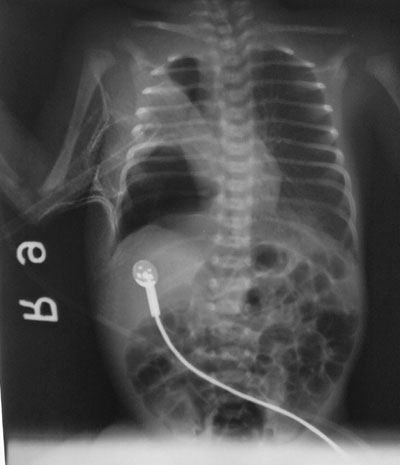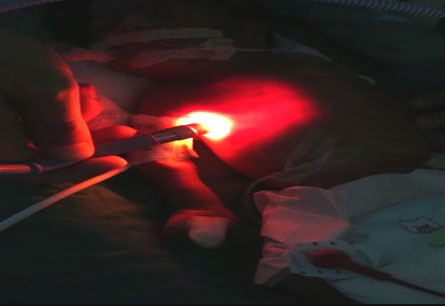|
|
|
Indian Pediatr 2017;54: 149 |
 |
Trans-illumination in Pneumothorax: A Useful
Bedside Tool
|
|
*Adhi Arya and Anshuman Verma
Department of Pediatrics, Government Medical College
and Hospital, Chandigarh, India.
Email: [email protected]
|
|
Pneumothorax in the newborn is a medical and surgical
emergency. Early diagnosis with a high index of suspicion and use of
trans-illumination can be useful where in-house X-ray facilities
are not available readily, and when X-ray picture is doubtful.
Trans-illumination is nonionizing, noninvasive and portable, making it a
useful tool for the neonatal intensive care unit (NICU).
 |
|
Fig. 2 X-ray chest of the neonate
after intercostal tube insertion.
|
A neonate born at 31 weeks of gestation developed
respiratory distress soon after birth. Child was administered surfactant
at one hour of life and was shifted to NICU, where after showing initial
improvement, ventilatory requirements increased, and possibility of
patent ductus arteriosus (PDA) or pneumothorax were considered.
Trans-illumination was performed using a portable fiber-optic cold light
source machine (GLOBAL) (Web
Video 1). After switching off all the lights, cold light source
probe was placed perpendicular to the skin and sufficient pressure
applied to prevent light leak. Changes in the size and shape of the
corona of light were noted as well as the appearance of light separated
from the corona. The right side of hemi-thorax had diffuse corona of
light as compared to left side (Fig. 1), confirming the
diagnosis of pneumothorax. We placed an intercostal drainage (ICD) tube
without waiting for X-ray confirmation, as child was
hemodynamically unstable. Chest X-ray done post-ICD insertion had
residual pneumothorax (Fig. 2), which resolved
subsequently.
 |
|
Fig. 1 Diffuse corona of light on right
side demonstrated by trans-illumination
|
False negative results on transillumination can occur in infants with
increased subcutaneous fat or edema. The thickened tissue, particularly
in the case of edema, interferes with trans-illumination. False
positives trans-illumination can occur in infants with congenital lobar
emphysema and pneumo-mediastinum.
|
|
|
 |
|

